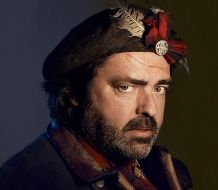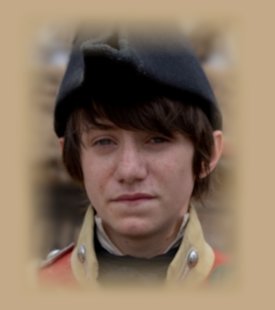Post by Robert Rogers on Jul 8, 2014 1:11:12 GMT
Name: (Lietenant Colonel) Robert Rogers
Age: 44
Patriot, Loyalist, Neutral/Undecided, Hessian, French, N. American: Loyalist
Physical Appearance:
Robert is overweight but, surprisingly, in pretty good shape. He is about average height for men during this time period. His shaggy dark brown hair is paired perfectly with his full beard and mustache. A few grey hairs are starting to make their appearance, much to his dismay.
Strengths:
Robert is very cunning and quick to act. Single-handily, he created the Queen's Rangers during the French and Indian War. He is also a great leader that cares greatly for his men. So much that he paid his men from what little money he had in his own pocket. Robert' is a great fighter. He is a great shot with a rifle and can easily survive in the wild. His training style was unique in that his men could withstand almost any extreme weather, and could fight in the wilderness with ease.
Weaknesses:
Despite is many strengths, Robert has many weaknesses. For one, he was a strong alcoholic. He did not go anywhere without a flask or bottle. Robert also did not have much patience dealing with others. Most of his time was spent on his own and in charge of his own men. Dealing with others and taking orders was not his strong suit. Along with impatience, Robert became bored easily. He did not take well to standing around. Instead he was constantly moving and difficult to find. Robert also had a very short temper. The alcohol did not help with this nor did it with any of his other weaknesses.
Background:
Robert was born to James and Mary McFatridge in a small town in Massachusetts. Both his parents were Irish immigrants and because of this, he also obtained a slight Irish accent. He wasn't at his home for long before his family relocated and his father founded a new town, called Munterloney in New Hampshire. Here Robert spent his youth. During King George's War, he joined the militia as a private, guarding the frontier.
Robert is most known for his career in the French and Indian War. Just as the war broke out, he was appointed as an official recruiter for Colonel John Wilslow. He immediately began mustering a great number of soldiers with took the name of "Rogers' Rangers". His recruitment was greatly supported by the people in the frontiers. Although they were never fully respected by the British regulars, Rogers' Rangers were one of the few non-Indian forces that worked in the inhospitable region. Robert had many great victories but like other leaders, he did have a few losses. He worked with Native Americans that were on the British side but also fought against the others. In November 1760, he received the submission of the French on the Great Lakes. Shortly after, the Rangers were disbanded. He chose to command another company in New York, however, that too disbanded and Robert was forced into retirement.
After the war, Robert returned home and married a woman named Elizabeth Browne. Robert aided during Pontiac's rebellion but was greatly defeated. He slipped into great debt for he paid his men with his own money. Looking for anyway to resolve this, he turned to fur trading and then gambling. However this only landed him in jail to which he escaped. Robert returned to England looking for his pay but instead was made royal governor of Fort Michilimackinac. Constantly, Robert tried for debt relief, including returning to England. It was during this time, Robert's wife divorced him and he switched to alcohol to aid his problems.
When news that the revolution was about to break out, Robert immediately returned to America. Most looked upon him to return to the rangers. However, they were at a total loss to explain his drunken and licentious behavior. He was arrested one time for thoughts of him being a spy but released on parole that he would not serve against the colonies. He was offered a commission but refused, only later to write to George Washington asking for a command. When Washington had him arrested, he escaped and wandered around, gathering people, and stopping at every tavern. Eventually he offered his services to the British Army where he formed the Queen's Rangers. His loyalty to the British or the Patriots may have been flaky, but he would forever remain loyal to his men.
Age: 44
Patriot, Loyalist, Neutral/Undecided, Hessian, French, N. American: Loyalist
Physical Appearance:
Robert is overweight but, surprisingly, in pretty good shape. He is about average height for men during this time period. His shaggy dark brown hair is paired perfectly with his full beard and mustache. A few grey hairs are starting to make their appearance, much to his dismay.
Strengths:
Robert is very cunning and quick to act. Single-handily, he created the Queen's Rangers during the French and Indian War. He is also a great leader that cares greatly for his men. So much that he paid his men from what little money he had in his own pocket. Robert' is a great fighter. He is a great shot with a rifle and can easily survive in the wild. His training style was unique in that his men could withstand almost any extreme weather, and could fight in the wilderness with ease.
Weaknesses:
Despite is many strengths, Robert has many weaknesses. For one, he was a strong alcoholic. He did not go anywhere without a flask or bottle. Robert also did not have much patience dealing with others. Most of his time was spent on his own and in charge of his own men. Dealing with others and taking orders was not his strong suit. Along with impatience, Robert became bored easily. He did not take well to standing around. Instead he was constantly moving and difficult to find. Robert also had a very short temper. The alcohol did not help with this nor did it with any of his other weaknesses.
Background:
Robert was born to James and Mary McFatridge in a small town in Massachusetts. Both his parents were Irish immigrants and because of this, he also obtained a slight Irish accent. He wasn't at his home for long before his family relocated and his father founded a new town, called Munterloney in New Hampshire. Here Robert spent his youth. During King George's War, he joined the militia as a private, guarding the frontier.
Robert is most known for his career in the French and Indian War. Just as the war broke out, he was appointed as an official recruiter for Colonel John Wilslow. He immediately began mustering a great number of soldiers with took the name of "Rogers' Rangers". His recruitment was greatly supported by the people in the frontiers. Although they were never fully respected by the British regulars, Rogers' Rangers were one of the few non-Indian forces that worked in the inhospitable region. Robert had many great victories but like other leaders, he did have a few losses. He worked with Native Americans that were on the British side but also fought against the others. In November 1760, he received the submission of the French on the Great Lakes. Shortly after, the Rangers were disbanded. He chose to command another company in New York, however, that too disbanded and Robert was forced into retirement.
After the war, Robert returned home and married a woman named Elizabeth Browne. Robert aided during Pontiac's rebellion but was greatly defeated. He slipped into great debt for he paid his men with his own money. Looking for anyway to resolve this, he turned to fur trading and then gambling. However this only landed him in jail to which he escaped. Robert returned to England looking for his pay but instead was made royal governor of Fort Michilimackinac. Constantly, Robert tried for debt relief, including returning to England. It was during this time, Robert's wife divorced him and he switched to alcohol to aid his problems.
When news that the revolution was about to break out, Robert immediately returned to America. Most looked upon him to return to the rangers. However, they were at a total loss to explain his drunken and licentious behavior. He was arrested one time for thoughts of him being a spy but released on parole that he would not serve against the colonies. He was offered a commission but refused, only later to write to George Washington asking for a command. When Washington had him arrested, he escaped and wandered around, gathering people, and stopping at every tavern. Eventually he offered his services to the British Army where he formed the Queen's Rangers. His loyalty to the British or the Patriots may have been flaky, but he would forever remain loyal to his men.









